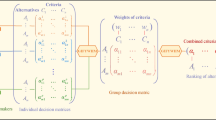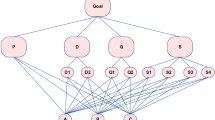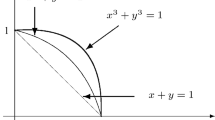Abstract
To denote the reciprocally uncertain hesitancy of decision makers, this paper introduces a new type of fuzzy sets called interval-valued multiplicative hesitant fuzzy variables (IVMHFVs), which is an extension of multiplicative hesitant fuzzy variables. On the basis of IVMHFVs, interval-valued multiplicative hesitant fuzzy preference relations (IVMHFPRs) are introduced. To rank objects based on IVMHFPRs reasonably, the consistency of IVMHFPRs is studied and a consistency definition is presented. Using this concept, a 0–1 mixed programming model for judging the consistency of IVMHFPRs is built, and a consistency-based programming model for deriving consistent IVMHFPRs is constructed. When the offered IVMHFPRs are incomplete, a model for determining missing values is established. In the setting of group decision making, a consensus index is defined and an interactive method for improving the consensus is offered. After that, an approach to group decision making with inconsistent and incomplete IVMHFPRs is developed. Meanwhile, a practical example is provided to show the application of the new method.

Similar content being viewed by others
References
Arbel A, Vargas LG (1990) The analytic hierarchy process with interval judgments. In: Proceedings of IXth international symposium on MCDM Fair fax
Cabrerizo FJ, Chiclana F, Ureña MR, Herrera-Viedma E (2013) Challenges and open questions in soft consensus models. In: Joint IFSA World Congress and NAFIPS annual meeting (IFSA/NAFIPS), Edmonton, AB, pp 944–949
Chandran B, Golden B, Wasil E (2005) Linear programming models for estimating weights in the analytic hierarchy process. Comput Oper Res 32(9):2235–2254
Chen N, Xu ZS, Xia MM (2013) Interval-valued hesitant preference relation relations and their applications to group decision making. Knowl Based Syst 37:528–540
Chen SM, Cheng SH, Lin TE (2015) Group decision making systems using group recommendations based on interval fuzzy preference relations and consistency matrices. Inf Sci 298:555–567
Genç S, Boran FE, Akay D, Xu ZS (2010) Interval multiplicative transitivity for consistency, missing values and priority weights of interval fuzzy preference relations. Inf Sci 180(24):4877–4891
Hua MM, Ren PY, Lan JB, Wang J, Zheng WM (2014) Note on “Some models for deriving the priority weights from interval fuzzy preference relations”. Eur J Oper Res 237(2):771–773
Islam R, Biswal MP, Alam SS (1997) Preference programming and inconsistent interval judgments. Eur J Oper Res 97(1):53–62
Liu F (2009) Acceptable consistency analysis of interval reciprocal comparison matrices. Fuzzy Sets Syst 160(18):2686–2700
Liu F, Zhang WG, Zhang LH (2014) A group decision making model based on a generalized ordered weighted geometric average operator with interval preference matrices. Fuzzy Sets Syst 246(1):1–18
Meng FY, An QX (2017) An approach for group decision making method with hesitant fuzzy preference relations. Knowl Based Syst 127:1–15
Meng FY, Tan CQ (2017) A new consistency concept for interval multiplicative preference relations. Appl Soft Comput 52:262–276
Meng FY, Chen XH, Tan CQ (2016) Cooperative fuzzy games with interval characteristic functions. Oper Res 16(1):1–24
Meng FY, An QX, Tan CQ, Chen XH (2017a) An approach for group decision making with interval fuzzy preference relations based on additive consistency and consensus analysis. IEEE Trans Syst Man Cybern Syst 47(8):2069–2082
Meng FY, Tan CQ, Chen XH (2017b) Multiplicative consistency analysis for interval reciprocal preference relations: a comparative study. Omega 68:17–38
Meng FY, Tang J, Xu ZS (2017c) Exploiting the priority weights from interval linguistic fuzzy preference relations. Soft Comput. https://doi.org/10.1007/s00500-017-2878-y
Meng FY, Tang J, An QX, Chen XH (2017d) Decision making with intuitionistic linguistic preference relations. Int Trans Oper Res. https://doi.org/10.1111/itor.12383
Orlovsky S (1978) Decision-making with a fuzzy preference relation. Fuzzy Sets Syst 1(3):155–167
Saaty TL (1980) The analytic hierarchy process. McGraw-Hill, New York
Saaty TL, Vargas LG (1987) Uncertainty and rank order in the analytic hierarchy process. Eur J Oper Res 32(1):107–117
Tang J, An QX, Meng FY, Chen XH (2017) A natural method for ranking objects from hesitant fuzzy preference relations. Int J Inf Technol Decis Mak 16(4):1611–1646
Tang J, Meng FY, Li CL, Li CH (2018) A consistency-based approach to group decision making with uncertain multiplicative linguistic fuzzy preference relations. J Intell Fuzzy Syst 35(1):1037–1054
Torra V (2010) Hesitant fuzzy sets. Int J Intell Syst 25(6):529–539
Ureña R, Chiclana F, Alonso S, Morente-Molinera JA, Herrera-Viedma E (2014) On incomplete fuzzy and multiplicative preference relations in multi-person decision making. Proc Comput Sci 31:793–801
Ureña R, Chiclana F, Fujita H, Herrera-Viedma E (2015a) Confidence-consistency driven group decision making approach with incomplete reciprocal intuitionistic preference relations. Knowl Based Syst 89:86–96
Ureña R, Chiclana F, Herrera-Viedma E (2015b) Consistency based completion approaches of incomplete preference relations in uncertain decision contexts. In: IEEE International Conference on Fuzzy Systems, Istanbul, Turkey, pp 1–6
Ureña R, Chiclana F, Morente-Molinera JA, Herrera-Viedma E (2015c) Managing incomplete preference relations in decision making: a review and future trends. Inf Sci 302:14–32
Ureña R, Chiclana FJ, Morente-Molinera JA, Herrera-Viedma E (2016) GDM-R: a new framework in R to support fuzzy group decision making processes. Inf Sci 357:161–181
Ureña R, Chiclana F, Melançon G, Herrera-Viedma E (2019) A social network based approach for consensus achievement in multiperson decision making. Inf Fusion 47:72–87
Wang ZJ (2015) A note on “A goal programming model for incomplete interval multiplicative preference relations and its application in group decision-making”. Eur J Oper Res 247:867–871
Wang ZJ, Chen YG (2014) Logarithmic least squares prioritization and completion methods for interval fuzzy preference relations based on geometric transitivity. Inf Sci 289:59–75
Wang ZJ, Li KW (2012) Goal programming approaches to deriving interval weights based on interval fuzzy preference relations. Inf Sci 193(193):180–198
Wang ZJ, Li KW (2015) A multi-step goal programming approach for group decision making with incomplete interval additive reciprocal comparison matrices. Eur J Oper Res 242(3):890–900
Wang YM, Yang JB, Xu DL (2005a) Interval weight generation approaches based on consistency test and interval comparison matrices. Appl Math Comput 167(1):252–273
Wang YM, Yang JB, Xu DL (2005b) A two-stage logarithmic goal programming method for generating weights from interval comparison matrices. Fuzzy Sets Syst 152(3):475–498
Wang J, Lan JB, Ren PY, Luo YY (2012) Some programming models to derive priority weights from additive interval fuzzy preference relation. Knowl Based Syst 27(1):69–77
Wei YQ, Liu JS, Wang XZ (1994) Concept of consistence and weights of the judgement matrix in the uncertain type of AHP. Syst Engine Theory Prac 14(1):16–22
Wu J, Chiclana F (2014) A social network analysis trust-consensus based approach to group decision-making problems with interval-valued fuzzy reciprocal preference relations. Knowl Based Syst 59:97–107
Xia MM, Xu ZS (2011) Hesitant fuzzy information aggregation in decision making. Int J Approx Reason 52(3):395–407
Xia MM, Xu ZS (2014) Interval weight generation approaches for reciprocal relations. Appl Math Modell 38(3):828–838
Xu ZS (2001) A practical method for priority of interval number complementary judgment matrix. Oper Res Manage Sci 10(1):16–19
Xu ZS (2011) Consistency of interval fuzzy preference relations in group decision making. Appl Soft Comput 11(5):3898–3909
Xu ZS, Chen J (2008) Some models for deriving the priority weights from interval fuzzy preference relations. Eur J Oper Res 184(1):266–280
Xu YJ, Chen L, Rodríguez RM, Herrera F, Wang HM (2016) Deriving the priority weights from incomplete hesitant fuzzy preference relations in group decision making. Knowl Based Syst 99:71–78
Xu YJ, Francisco JC, Herrera-Viedma E (2017) A consensus model for hesitant fuzzy preference relations and its application in water allocation management. Appl Soft Comput 58:265–284
Xu YJ, Li CY, Wen XW (2018) Missing values estimation and consensus building for incomplete hesitant fuzzy preference relations with multiplicative consistency. Int J Comput Intell Syst 11(1):101–119
Zhang ZM (2016) Deriving the priority weights from incomplete hesitant fuzzy preference relations based on multiplicative consistency. Appl Soft Comput 46:37–59
Zhang ZM (2017) A framework of group decision making with hesitant fuzzy preference relations based on multiplicative consistency. Int J Fuzzy Syst 19(4):982–996
Zhang ZM, Wu C (2014a) Deriving the priority weights from hesitant multiplicative preference relations in group decision making. Appl Soft Comput 25:107–117
Zhang ZM, Wu C (2014b) A decision support model for group decision making with hesitant multiplicative preference relations. Inf Sci 282:136–166
Zhang ZM, Wang C, Tian XD (2015a) A decision support model for group decision making with hesitant fuzzy preference relations. Knowl Based Syst 86:77–101
Zhang ZM, Wang C, Tian XD (2015b) Multi-criteria group decision making with incomplete hesitant fuzzy preference relations. Appl Soft Comput 36:1–23
Zhang Z, Kou XY, Dong QX (2018a) Additive consistency analysis and improvement for hesitant fuzzy preference relations. Expert Syst Appl 98:118–128
Zhang Z, Kou XY, Yu WY, Guo CH (2018b) On priority weights and consistency for incomplete hesitant fuzzy preference relations. Knowl Based Syst 143:115–126
Zhu B, Xu ZS (2014a) Regression methods for hesitant fuzzy preference relations. Tech Econ Develop Econ 19(sup1):S214–S227
Zhu B, Xu ZS (2014b) Analytic hierarchy process-hesitant group decision making. Eur J Oper Res 239(3):794–801
Zhu B, Xu ZS, Xu JP (2014) Deriving a ranking from hesitant fuzzy preference relations under group decision making. IEEE Trans Cybern 44(8):1328–1337
Zhu B, Xu ZS, Zhang R, Hong M (2016) Hesitant analytic hierarchy process. Eur J Oper Res 250(2):602–614
Acknowledgements
This work was supported by the National Natural Science Foundation of China (Nos. 71571192, 71601049, and 71671188), the Innovation-Driven Project of Central South University (No. 2018CX039), the Fundamental Research Funds for the Central Universities of Central South University (No. 2018zzts094), the Major Project for National Natural Science Foundation of China (No. 71790615), and the State Key Program of National Natural Science of China (No. 71431006).
Author information
Authors and Affiliations
Corresponding author
Ethics declarations
Conflict of interest
The authors declare that there is no conflict of interests regarding the publication of this paper.
Ethical approval
This article does not contain any studies with human participants or animals performed by any of the authors.
Additional information
Communicated by V. Loia.
Publisher’s Note
Springer Nature remains neutral with regard to jurisdictional claims in published maps and institutional affiliations.
Rights and permissions
About this article
Cite this article
Tang, J., Meng, F. Calculating priority weights from interval-valued multiplicative hesitant fuzzy preference relations. Soft Comput 23, 11573–11592 (2019). https://doi.org/10.1007/s00500-018-03698-2
Published:
Issue Date:
DOI: https://doi.org/10.1007/s00500-018-03698-2




